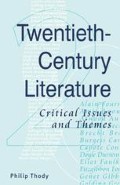Abstract
In spite of the certainty with which cowardice is condemned by twentieth-century writers, it is unusual for them to declare, in the tones which T. S. Eliot uses in the choruses from The Rock, in 1930, that However you disguise it, this thing does not change: The perpetual struggle of Good and Evil. Even if the question of how we ought to act is put in the secular terms of a contest between right and wrong, rather than with the religious overtones implied by the words Good and Evil, the answers suggested by most of the playwrights and novelists of the twentieth century are ambiguous, uncertain and often ironic.
The moral certainties of some early twentieth-century writers; antisemitism as a recurrent attitude in the same period; some unfortunate phrases from Claudel, Aldous Huxley and Jean-Paul Sartre; the writer and politics; some advice from Yeats.
Preview
Unable to display preview. Download preview PDF.
Notes
Quoted by William A. Chace, in The Political Identities of Ezra Pound and T. S. Eliot (Stanford University Press, California, 1973), p. 79.
For a full discussion of this and other matters, see Alice K. Turner, The History of Hell (Harcourt Brace, New York, 1993).
Copyright information
© 1996 Philip Thody
About this chapter
Cite this chapter
Thody, P. (1996). Moral Dilemmas I: Religion, Ethics and some Incidental Truths. In: Twentieth-Century Literature. Palgrave, London. https://doi.org/10.1007/978-1-349-24399-0_8
Download citation
DOI: https://doi.org/10.1007/978-1-349-24399-0_8
Publisher Name: Palgrave, London
Print ISBN: 978-0-333-61534-8
Online ISBN: 978-1-349-24399-0
eBook Packages: Palgrave Literature & Performing Arts CollectionLiterature, Cultural and Media Studies (R0)

